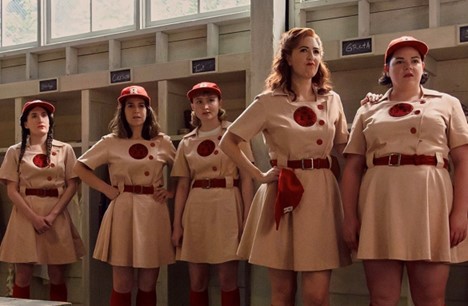Ranked number one on Amazon Prime’s Top Ten in the U.S., the first season of Amazon Prime’s sports comedy-drama “A League of Their Own” was released on August 12. It has since created a space for queer representation and storytelling unlike anything to date.
Co-created by director Will Graham and Abbi Jacobson who stars as Peaches’ catcher and coach Carson Shaw, “A League of Their Own” (“ALOTO”) is set in 1943 during WWII and follows the entertaining conception and journey of the Rockford Peaches — a new league of All-American professional women’s baseball players. The series is nothing short of television gold with dynamic baseball scenes, heartfelt and incredibly conscious storytelling and character development, and exceptional acting from its seasoned cast.
Brilliantly, “ALOTO” takes the beloved 1992 Penny Marshall film of the same name while maintaining the inspiring story of a team of underdogs playing to win their place on the baseball field. However, the series is reimagined with more accurate realities of gender, sexuality, and racial experience at the time, which were unfortunately only brushed past in the original. Nonetheless, the show undoubtedly presents a realistic portrayal of the real-life All-American Girls Professional Baseball League that inspired both the movie and series. As a result, it has become known as a Women-Loving-Women’s television dream.
Deliciously, we watch truly badass women take their place at the plate and pitch, swing, and hit their way through sexism and misogyny. Even in pink pleated skirts and lipstick —up against the shackles of patriarchy —the Rockford Peaches prove themselves to be a team worthy of playing baseball.
Beyond being an attention-grabbing action of a classic American sports series, “ALOTO” is brimming with glorious sentimentality and heart, especially with its many diverging storylines surrounding queer experience during the early 1940s.
At the series’ start when hearing bomb-shell beauty and first base player Greta Gill (D’Arcy Carden) exclaim, “We’re all fucking fruit” to her new teammates, one immediately gets the suspicion that something LGBTQIA+ is about to unfold in which a romance within the team begins to unfold. Additionally, the follow-through on explicitly queer storylines and characters is amazingly well researched and attentive to many perspectives within the LGBTQIA+ experience, making each episode increasingly and wonderfully queerer.
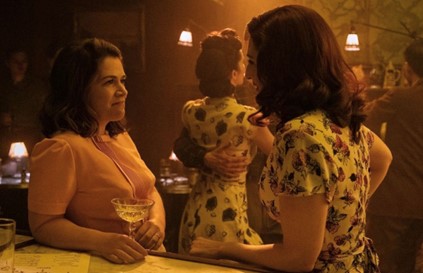
From artful examples of the female gaze to raw examinations of characters’ sexual and gender expression within an unaccepting world working to irradicate anything beyond the heteronormative standard, “ALOTO” show us all the difficult yet charming aspects of boundless love that rarely makes it to the silver screen.
Though the explicitly Women-Loving-Women storylines are the gem of “ALOTO,” the attention to all forms of relationships is stunning. Friendship and camaraderie are cornerstones of the series, and each uniquely complicated and caring relationship is explored with honesty, humor, and a perspective that reads incredibly real. We see this in friendships like Greta and Jo’s, Max and Clance’s, and the general home-like atmosphere cultivated amongst the Peaches.
Since its debut, the sincere season has become a home run with audiences. Fans have taken to social media platforms, expressing their appreciation for “ALOTO’s” themes, representation, and especially its imperially hot cast.
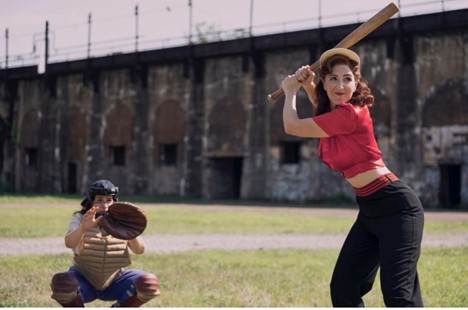
As the title implies, the series centers on its characters finding a space of their ‘own’ by solidifying their moment in history. For the Rockford Peaches, their diehard, uphill fight towards the championship is all to be recognized as legitimate athletes. For others in the show, finding a “league of their own” means discovering a place to be themselves.
Conscious of this, the series does remind us that “There’s no crying in baseball,” a line reprised from the original movie. However, tears of grief, anger, joy, laughter ,and relatability will stream down audiences’ faces–reminders of how powerful finding community can be for people usually denied the freedom to be themselves and how devastating homophobia is.
A compelling example comes at the end of episode six: “Stealing Home” where some Peaches players celebrate making it to the playoffs at an underground queer night club that gets violently raided by police forces. The dichotomy between a safe haven for the characters turned into tragic, hate-filled hell within the scene is hauntingly unforgettable–a must-see for audiences.
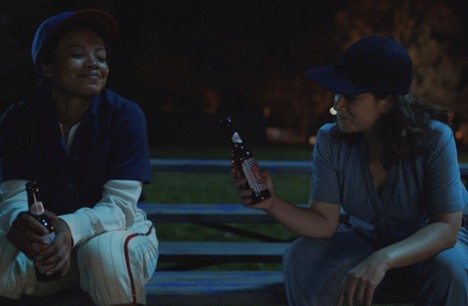
Within an equally extraordinary scene, Carson reads from the novel A Tree Grows in Brooklyn by Betty Smith, also released in 1943.“Dear God…let me be something every minute of every hour of my life. Let me be gay; let me be sad…Only let me be something every blessed minute. And when I sleep, let me dream all the time so that not one little piece of living is ever lost.”
Throughout the eight-episode season, you will see the characters of “ALOTO” be something for themselves and their teammates every second. They are women, sudo-mothers to one another, friends and defenders of their teammates, earned places on the field, and individuality. They are inspired and dedicated athletes, passionate and curious lovers, and strong examples of resilience–constantly embodying the age-old maxim “Life Will Out.”
And in experiencing these layered, dimensional characters be something, audiences may see flashes of themselves. In the character’s struggle to accept same sex attraction, fear of retaliation, self-discovery, and racial discrimination you may notice pain, success or failure real within the hours of your life too.
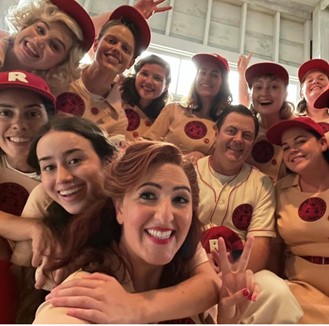
Equipped with brilliant writing, the show is blessed with a grand-slam cast and standout performance, including comedy actress D’Arcy Carden (from “The Good Place”) who is delightful as Greta Gill–quickly making her a fan favorite. Similarly, Chanté Adams is wonderful as Maxine (“Max.”) Her charisma makes audiences immediately root for Max, primarily upon seeing her friendship with Clance (Gbemisola Ikumelo), who is equally exquisite.
Truly, the series has paved a space all of its own, which is incredibly important considering harmful legislation like Florida’s “Don’t Say Gay Bill” at the forefront of the United State’s political climate. The multitudes contained within “ALOTO” and its insistence on acknowledging queerness with talented writing, acting, and execution are essential.
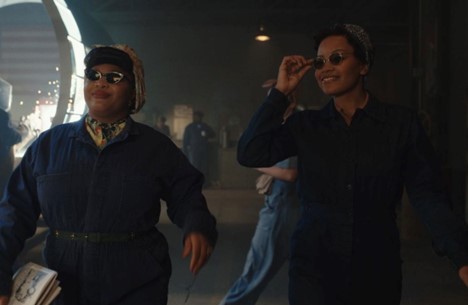
Baseball, lesbians, underground queer nightclubs, teamwork, profoundly true female friendship, exploration of sexuality, gender, and identity expression, and Chanté Adams in a suit. You can’t beat it. So, step up to the plate and hit a home run by watching the dazzingly “A League of Their Own” today.
Clairesse Schweig is an Arts & Entertainment Editor and Writer for the fall 2022 quarter. They can be reached at cschweig@uci.edu.

